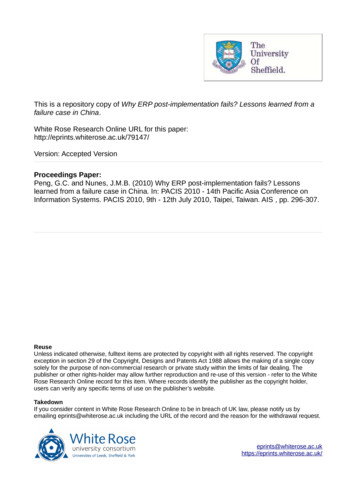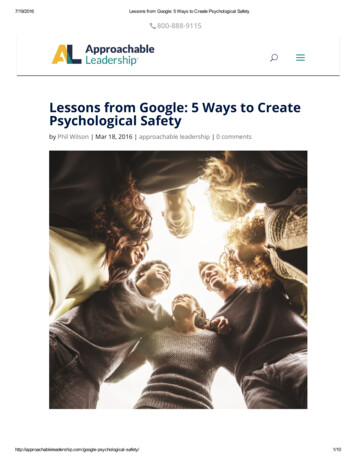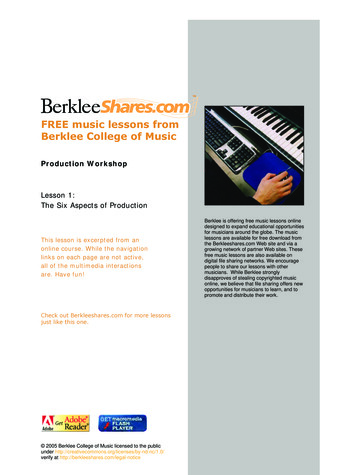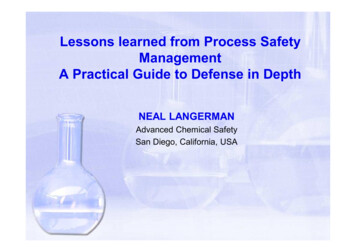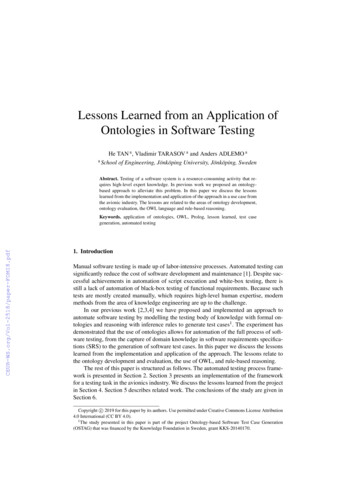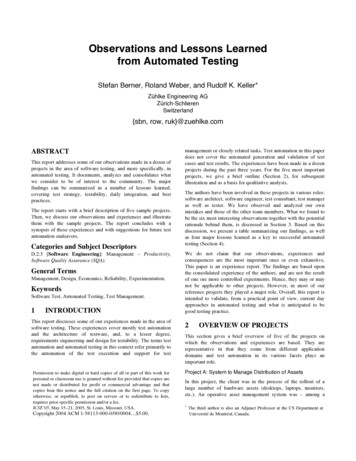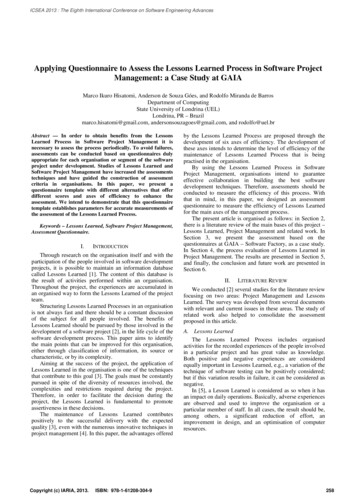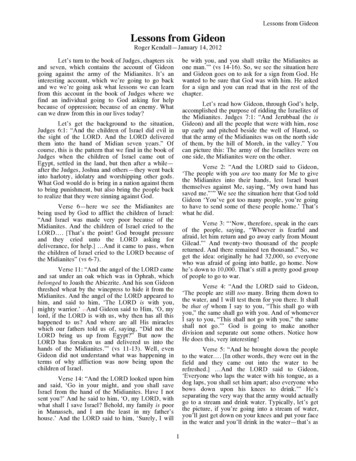
Transcription
Lessons from GideonLessons from GideonRoger Kendall—January 14, 2012Let’s turn to the book of Judges, chapters sixand seven, which contains the account of Gideongoing against the army of the Midianites. It’s aninteresting account, which we’re going to go backand we we’re going ask what lessons we can learnfrom this account in the book of Judges where wefind an individual going to God asking for helpbecause of oppression; because of an enemy. Whatcan we draw from this in our lives today?be with you, and you shall strike the Midianites asone man.’” (vs 14-16). So, we see the situation hereand Gideon goes on to ask for a sign from God. Hewanted to be sure that God was with him. He askedfor a sign and you can read that in the rest of thechapter.Let’s read how Gideon, through God’s help,accomplished the purpose of ridding the Israelites ofthe Midianites. Judges 7:1: “And Jerubbaal (he isGideon) and all the people that were with him, roseup early and pitched beside the well of Harod, sothat the army of the Midianites was on the north sideof them, by the hill of Moreh, in the valley.” Youcan picture this: The army of the Israelites were onone side, the Midianites were on the other.Let’s get the background to the situation,Judges 6:1: “And the children of Israel did evil inthe sight of the LORD. And the LORD deliveredthem into the hand of Midian seven years.” Ofcourse, this is the pattern that we find in the book ofJudges when the children of Israel came out ofEgypt, settled in the land, but then after a while—after the Judges, Joshua and others—they went backinto harlotry, idolatry and worshipping other gods.What God would do is bring in a nation against themto bring punishment, but also bring the people backto realize that they were sinning against God.Verse 2: “And the LORD said to Gideon,‘The people with you are too many for Me to givethe Midianites into their hands, lest Israel boastthemselves against Me, saying, “My own hand hassaved me.”’” We see the situation here that God toldGideon ‘You’ve got too many people, you’re goingto have to send some of these people home.’ That’swhat he did.Verse 6—here we see the Midianites arebeing used by God to afflict the children of Israel:“And Israel was made very poor because of theMidianites. And the children of Israel cried to theLORD . [That’s the point! God brought pressureand they cried unto the LORD asking fordeliverance, for help.] And it came to pass, whenthe children of Israel cried to the LORD because ofthe Midianites” (vs 6-7).Verse 3: “‘Now, therefore, speak in the earsof the people, saying, “Whoever is fearful andafraid, let him return and go away early from MountGilead.”’ And twenty-two thousand of the peoplereturned. And there remained ten thousand.” So, weget the idea: originally he had 32,000, so everyonewho was afraid of going into battle, go home. Nowhe’s down to 10,000. That’s still a pretty good groupof people to go to war.Verse 11: “And the angel of the LORD cameand sat under an oak which was in Ophrah, whichbelonged to Joash the Abiezrite. And his son Gideonthreshed wheat by the winepress to hide it from theMidianites. And the angel of the LORD appeared tohim, and said to him, ‘The LORD is with you,mighty warrior.’ . And Gideon said to Him, ‘O, mylord, if the LORD is with us, why then has all thishappened to us? And where are all His miracleswhich our fathers told us of, saying, “Did not theLORD bring us up from Egypt?” But now theLORD has forsaken us and delivered us into thehands of the Midianites.’” (vs 11-13). Well, evenGideon did not understand what was happening interms of why affliction was now being upon thechildren of Israel.Verse 4: “And the LORD said to Gideon,‘The people are still too many. Bring them down tothe water, and I will test them for you there. It shallbe that of whom I say to you, “This shall go withyou,” the same shall go with you. And of whomeverI say to you, “This shall not go with you,” the sameshall not go.’” God is going to make anotherdivision and separate out some others. Notice howHe does this, very interesting!Verse 5: “And he brought down the peopleto the water . [In other words, they were out in thefield and they came out into the water to berefreshed.] And the LORD said to Gideon,‘Everyone who laps the water with his tongue, as adog laps, you shall set him apart; also everyone whobows down upon his knees to drink.’” He’sseparating the very way that the army would actuallygo to a stream and drink water. Typically, let’s getthe picture, if you’re going into a stream of water,you’ll just get down on your knees and put your facein the water and you’ll drink in the water—that’s asVerse 14: “And the LORD looked upon himand said, ‘Go in your might, and you shall saveIsrael from the hand of the Midianites. Have I notsent you?’ And he said to him, ‘O, my LORD, withwhat shall I save Israel? Behold, my family is poorin Manasseh, and I am the least in my father’shouse.’ And the LORD said to him, ‘Surely, I will1
Lessons from Gideona dog laps the water—the one group.The other group did it differently. They didnot get down on their knees. They basically pickedup the water in their hands and they were looking upand around while drinking water out of the hands. Ijust want you to understand the picture here. Godused this in a very interesting way.must mean that there’s a hundred thousand of thearmy coming and they—the Midianites—panic. It’sexactly what happened.Verse 21: “And they stood, each man in hisplace, all around the camp. And all the army ran, andcried out, and fled. And the three hundred blew theram’s horns. And the LORD set every man’s swordagainst his fellow ” (vs 21-22). They just literallyslaughtered each other, because of the fear thatovercame them.Verse 7: “And the LORD said to Gideon, ‘Iwill save you by the three hundred men wholapped [from their hand] and will deliver theMidianites into your hand. And let all the otherpeople go, each man to his place.’ And the peopletook provisions in their hand, and their ram’s horns.And he sent away all the rest of Israel, each man tohis tent, and kept only those three hundred men. Andthe army of Midian was below him in the valley” (vs7-8).God did eliminate the Midianites by Hishand, and the army fled and Israel was spared. Thestory here is very interesting in that there are acouple of lessons that we can learn from thisaccount.I. God will fight your battles for you!It starts with 32,000, down to 300. Gideon issaying to himself, ‘God, I don’t think this is going towork out very well, but we’ll go forward.’Interesting! Be not fearful! What did Gideon do?It’s not by our might or our strength that weare going to win the battles that we fight that areeither against the demonic or satanic forces, oragainst those things in the world. It’s by God’spower that we get victory! If we seek His help—ifwe cry out to God for help—God is going to answerthose prayers and He will give us the strength andvictory over the enemy. 1-Cor. 15:57 says that it isChrist that gives us victory! Christ gives us victoryover the enemy and, indeed, we need to recognizethat it requires not a sign from God—Gideon went toGod and asked for a sign.Verse 16: “And he divided the three hundredmen into three companies. And he put a ram’s hornin every man’s hand with empty pitchers and torchesinside the pitchers.” I have really looked at thisScripture many times and I don’t know how oneman can hold a trumpet in one hand, a pitcher ofwater covering the torch in the other, and be able tomanipulate all of this. That’s what it says: he’s got atrumpet, he’s got a torch and he’s got the pitcher thatis hiding the torch—a cover over the torch. That’swhat we’re seeing here.For us it takes faith! It takes, faith, trust andconfidence in God. Not that God has to show us asign that He’s there. We know He’s there. We knowGod and we don’t need to go out and ask for a sign.It requires faith!Verse 17: “And he said to them, ‘Look atme, and do likewise. And, behold, when I come tothe edge of the camp, it shall be that, as I do, so youshall do. When I blow with a ram’s horn, I and allwho are with me, then you blow the ram’s horns alsoall around the camp ’” (vs 17-18). He’s got thesethree companies around the camp of the Midianitesand he’s going to blow the trumpet, and he’s goingto show the torch. It’s at night so you can imaginewhat the picture of this really looks like.Romans 8:31: “ If God is for us, who canbe against us?” If we are on God’s side, no enemyis ever going to prevail against us. We can have faithand trust, and we don’t need to fear the enemy.1-John 4:4: “You are of God, little children,and have overcome them because greater is He Whois in you than the one who is in the world.”Brethren, this is the first point. We can haveconfidence and faith because Christ is in us throughthe Holy Spirit, and we will have victory over theenemy. We can be thankful for that, so this a veryvital lesson that we can learn.Verse 19: “So Gideon and the hundred menwith him came to the edge of the camp in thebeginning of the middle watch. And they had butnewly set the watch. And they blew the ram’s hornsand broke the pitchers that were in their hands. Andthe three companies blew the ram’s horns and brokethe pitchers and held the torches in their left handsand the ram’s horns in their right hands to blow. Andthey cried, ‘A sword for the LORD and forGideon!’” (vs 19-20).II. Be on guard! Be vigilant! Be Alert!This is what I’m going to expound on morehere in the sermon today; it’s going to focus on theway that God separated the 300 from the main armyof the Israelites. Again, we went over that and werecognize that God selected the few who lapped fromtheir hand rather than drinking directly out of thewater as a dog would drink. Why is that? Whatdifferentiates the two postures in drinking water?Here’s what happened. Again, picture thisstory. Can you imagine the ram’s horn blowing andyou’re asleep in the camp and these blasting hornsare going all around you. The lights, the torches, it2
Lessons from Gideonvery clearly that we need to be watchful. Matthew24:37: “Now, as it was in the days of Noah, so shallit also be at the coming of the Son of man. For as inthe days that were before the Flood, they were eatingand drinking, marrying and giving in marriage, untilthe day that Noah entered the ark; and they were notaware until the Flood came and took them all away;so shall it also be at the coming of the Son of man”(vs 37-39).If you’re in enemy territory and you’refacing a large force and one of the things that youhave to do is be on guard, be vigilant and to be alertand to be aware of the surroundings, what is goingon around you. So, the 300 were watchful. Theywere being alert! They were vigilant! Therefore,they were above and beyond the average soldierthere, because they were showing leadershipqualities. They were basically concerned not justabout themselves, but their fellow soldiers.Those around Noah as he was doing the ark,they weren’t aware of what was going on and whatwas coming. They were taken completely off guard,even though for the 100 years Noah was a ‘preacherof righteousness.’ Noah was giving warning, but noone was paying attention. In fact, they mocked him,and they thought it was foolishness to build an ark inthe middle of a plain many, many miles from anywater. So, “ they were not aware until the Floodcame and took them all away; so shall it also be atthe coming of the Son of man.”If you’re in enemy territory you don’t wantto all be down into the water and then suddenly findyourself being bushwhacked. In other words, you’vegot to be aware of what’s going on. So, we could saythat Gideon’s 300 were the elite. They were thespecial ones within that army who went above andbeyond in terms of being watchful.Brethren, that should describe us! We arethe elite of God! We are the firstfruits. Therefore,brethren, we’re going to be looking at theimportance of being watchful! of being vigilant! ofbeing aware of Verse 42: “Watch, therefore, because youdo not know in what hour your Lord is coming.”Here we can look at this particular aspect ofwatching: we need to be aware of prophecy, thecoming of Christ and realize and understand thatwe need to be spiritually prepared, emotionally;physically prepared for the days ahead. If we’re notreally on top of things in our lives,what’s going on around us in the worldwhat’s going on within the Churchwhat’s going on within God’s plan andprophecy—and to realize that we have a responsibility to keepour eyes on the Kingdom of God and to be doingthose things accordingly, so that we can be doingour part. We’re to be watchful and alert, not only tothe physical things around us, but our own spiritualcondition. So, this watchful and being vigilant reallycovers a very wide spectrum of what ourresponsibilities are. We’re going to be looking atsome of these aspects of what we need to bewatchful for.we can get lazywe can be distractedwe can find ourselves not being vigilant2-Timothy 4:5: “But as for you, be vigilantin all things ” We’re going to look at areas that weneed to be vigilant in. This word ‘vigilant’ means tokeep awake, to watch, to be sober! The word ‘sober’it doesn’t necessarily mean to be free of intoxicatingliquors. It means to spiritually-minded! In otherwords, you’re focusing on that which is of God andtruly spiritually minded. To be sober and aware ofyour surroundings. That’s what we’re talking abouthere.Why do we need to be watchful? Let megive you just a simple account that if you’re inenemy territory and if you have a mission toaccomplish, or if you’re going to be driving avehicle of some sort and you have to go from point‘A’ to point ‘B’ and you’re not vigilant and careful,you could find yourself into deep trouble anddifficulties: to be attacked or bushwhacked or to betaken unaware.My admonishment today is that we need tobe Brethren, that’s the point! We have to bewatchful. We have enemies. We’re living in a worldthat i
Lessons from Gideon 1 Lessons from Gideon Roger Kendall—January 14, 2012 Let’s turn to the book of Judges, chapters six and seven, which contains the account of Gideon going against the army of the Midianites. It’s an interesting account, which we’re going to go back and we we’re going ask what lessons we can learn from this account in the book of Judges where we find an individual .
